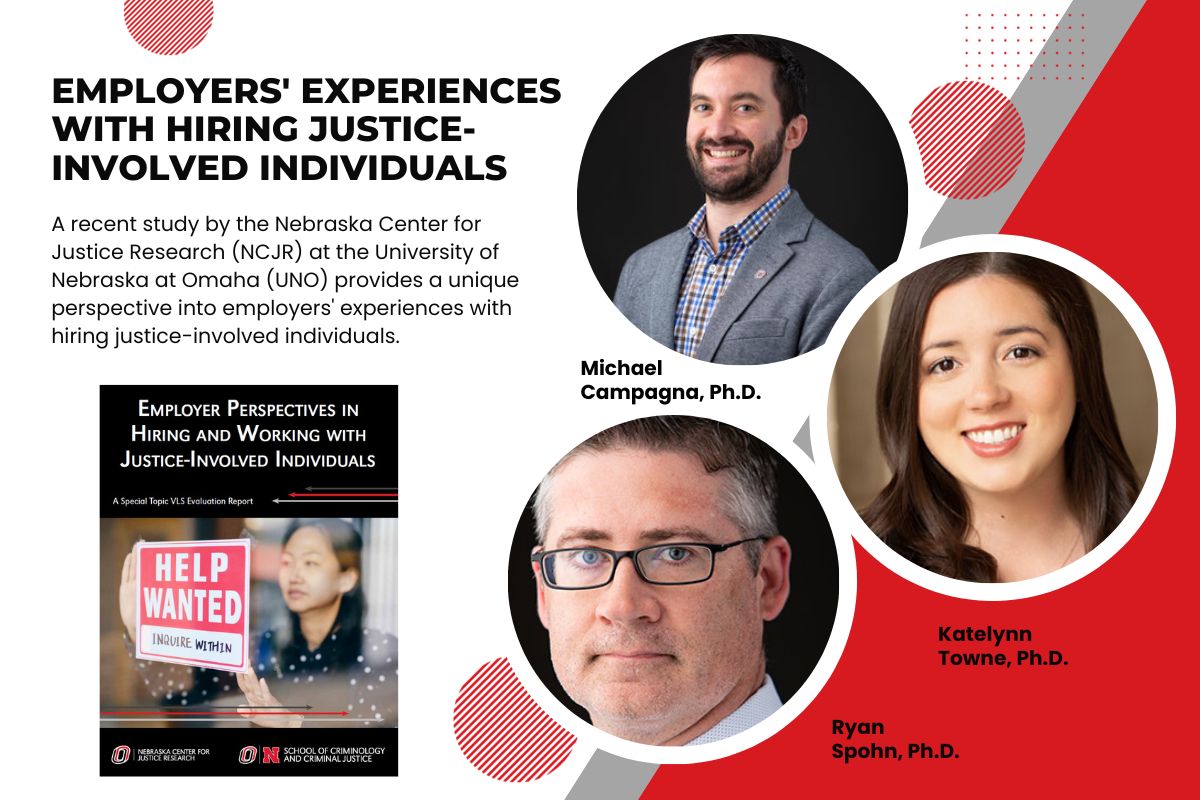UNO Report Illuminates Employers' Experiences with Hiring Justice-Involved Individuals
- contact: Debbie Vihstadt - College of Public Affairs and Community Service
- phone: 402.554.3033
- email: dvihstadt@unomaha.edu

The Nebraska Center for Justice Research (NCJR) at the University of Nebraska at Omaha (UNO) has unveiled a groundbreaking study shedding light on employers' experiences in hiring and employing justice-involved individuals, including former prisoners and those on probation or parole supervision.
The report, authored by a UNO research team led by Katelynn Towne, Ph.D., Michael Campagna, Ph.D., and Ryan Spohn, Ph.D., is a key component of NCJR’s evaluation of the legislatively funded Nebraska Vocational and Life Skills (VLS) initiative. This initiative aims to assist individuals in their process of reintegrating into the community from Nebraska correctional facilities or while on State probation.
Challenges in Employment for Justice-Involved Individuals
Obtaining stable employment is a primary goal for individuals reentering communities, seen as crucial to reducing the likelihood of returning to prison—an expensive cost to taxpayers. Despite Nebraska's low unemployment rates, employers often exhibit hesitancy in hiring justice-involved individuals due to concerns about liability, stigma, and onboarding difficulties.
Reentry professionals play a crucial role in assisting justice-involved Nebraskans in finding employment positions. Over the past eight years, Nebraska's VLS program, involving State agency workers and numerous community organizations, has equipped over 10,000 participants with essential workplace and life skills.
Employers' Positive Experiences
As part of their regular evaluation, UNO researchers gathered input from 18 employers known to work with justice-involved individuals. The study highlighted that employers were eager to describe the benefits of hiring justice-involved individuals, especially during labor shortages. Employees from this population were praised for their dedication and in-demand skills developed through collaboration with criminal justice agencies, proving indispensable to their employers.
Several employers noted that justice-involved individuals took on challenging roles that were hard to fill, contributing significantly to the productivity of their companies. A food services industry training supervisor emphasized the strong work ethic of these employees, stating, "They want to prove they work hard,” and added, "Loyalty, they could be very loyal to you if you give them that chance and they’re on the right path."
Challenges and Solutions
The study also revealed shared challenges between employers and justice-involved individuals, including issues with collaboration and communication with State agencies, a shortage of safe and affordable housing, and transportation barriers.
Collaboration and communication issues with State agencies often occurred during the hiring and recruiting stage. Employers working with VLS community providers had an easier time hiring from this population, emphasizing the need for such services in addition to State supervision.
Transportation emerged as a significant obstacle, limiting employees' ability to work certain shifts and impacting overall employment opportunities. Financial stability, linked to employment, was also identified as a challenge, affecting housing and basic amenities such as furniture.
Addressing Barriers and Building Support
Synthesizing prior research and the current findings, the report suggests that addressing barriers faced by formerly incarcerated individuals benefits both employees and employers, helping fill crucial vacancies, enhance services, and increase company productivity and profit.
The report emphasizes the need for a more welcoming work environment to navigate the stigma associated with having a criminal record. Dr. Katelynn Towne, NCJR Research Coordinator, advocates for flexibility and understanding, stating, "The inclusive approach sets the tone for others (e.g., co-workers, customers) to welcome these individuals and see past stigma."
The inclusive approach sets the tone for others (e.g., co-workers, customers) to welcome these individuals and see past stigma."
Call for a Comprehensive Reintegration Plan
The report urges a better-organized plan to reintegrate justice-involved individuals into Nebraska communities, emphasizing personal and community reflections on existing attitudes, barriers, policies, and laws. The ultimate goal is to encourage an environment supporting reentry success, stable employment, increased labor production, and public safety.
Dr. Towne added, "While the State does a great job providing opportunities, more could be done to reduce structural and community barriers causing harm to reentering persons." Michael Campagna, NCJR Research Associate, noted the risks of tapping into this employment population but highlighted the positive experiences of employers who took that risk.
NCJR Director Ryan Spohn concluded, "Better coordination between correctional facilities and potential employers is crucial."
NCJR's Commitment to Real-World Solutions
This report reaffirms UNO's commitment to addressing real-world challenges, contributing to solutions for employers, justice-involved individuals, and local communities.
About NCJR
The Nebraska Center for Justice Research (NCJR) at the University of Nebraska at Omaha (UNO) is dedicated to advancing research on justice and criminal behavior. Conducting impactful studies, NCJR aims to improve policies and practices within the criminal justice system.